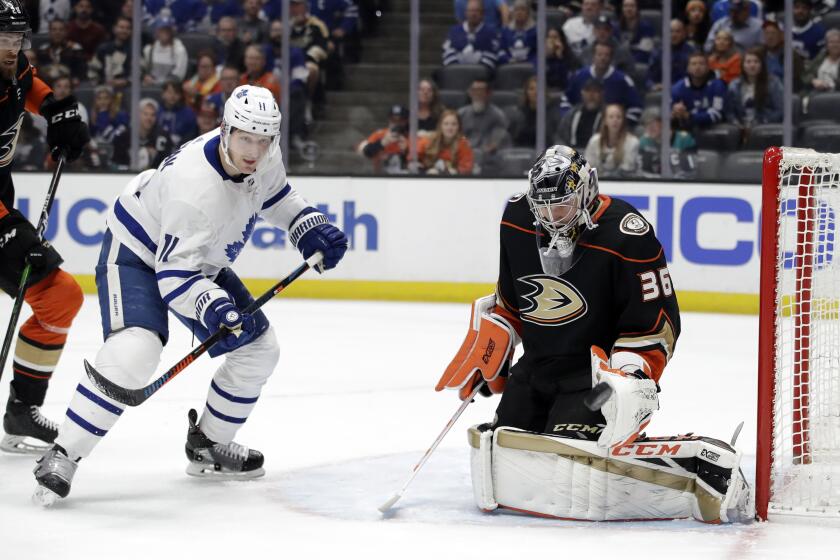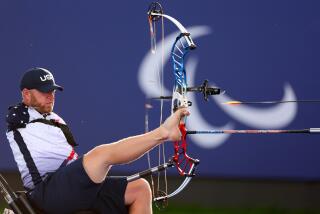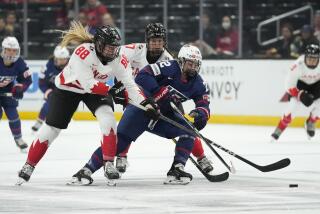Column: Sled hockey helps teenage double amputee thrive: ‘I’m in the best place possible’
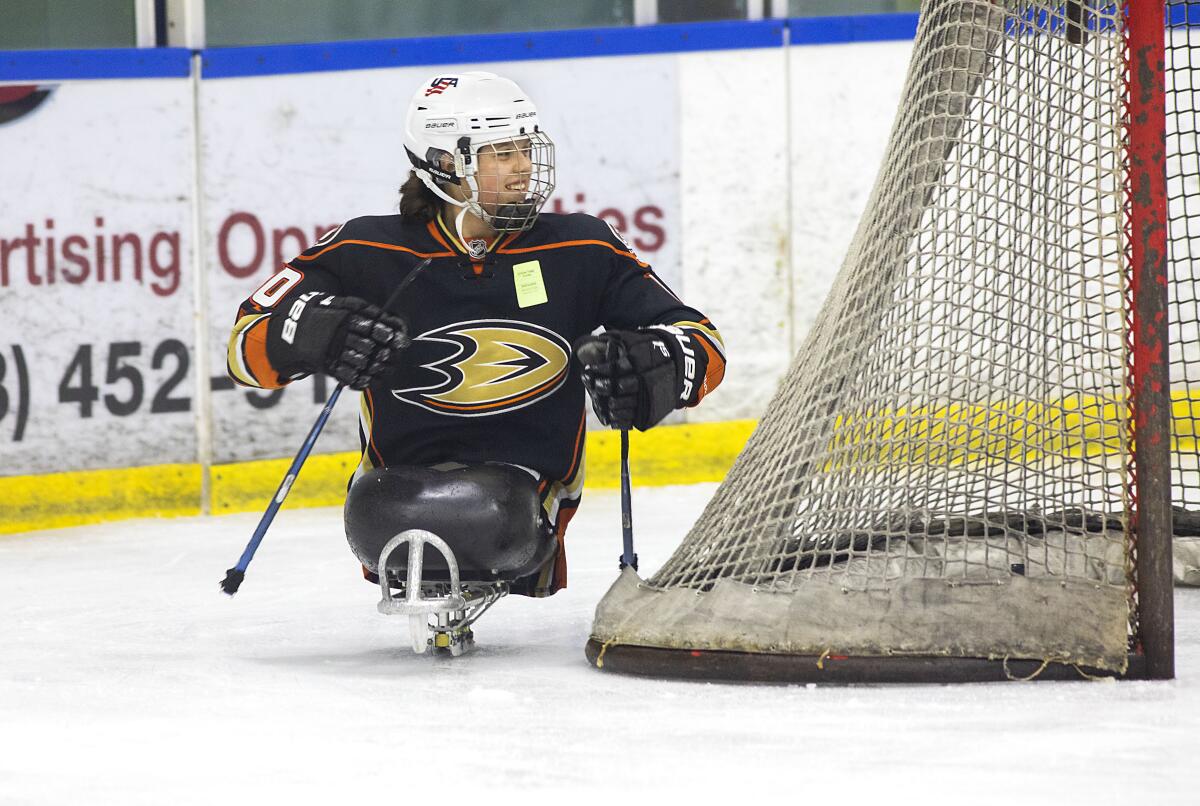
- Share via
SAN DIEGO — Adults stared at her over their cellphones, ready to flick their eyes downward if Lera Doederlein saw them gazing at her, but kids regarded her with open curiosity. She was about to go on the ice for an informal sled hockey practice and wasn’t wearing her prosthetic legs, instead moving around on the short, blue-star-decorated legs she calls her slippers. Without her microprocessor-equipped legs she’s small, but her poise and radiant smile give her a large presence.
She’s accustomed to gawkers, so she ignored the trailing eyes as she made her way through the shopping mall food court and down the stairs at UTC Ice in La Jolla. Pushing past a plastic curtain, she went to the scarred white plastic benches to put on her gear and pulled a Ducks jersey over her head before she climbed into her bucket-like sled. “At first it was really hard. I was thinking, ‘These people are so annoying. They’re staring at me.’ I got self-conscious,” she said of being watched. “But I’m here to do what I do. I mean, I play hockey, I go to school. I don’t care what you think. This is my life and I’m here.”
Doederlein, 16, is living on her own adventurous terms. Her spirit and ambition define her, not the physical limits she constantly pushes.
Doederlein plays sled hockey for the San Diego Ducks, who are affiliated with the Ducks, and is a member of the U.S. women’s national development team, the top level because women’s sled hockey isn’t yet a Paralympics sport. She was chosen this season’s 21st Duck, an annual award that honors perseverance, character and courage. After an opening night appearance she was invited back to address the team and read the lineup before a game. She hopes to go cycling with coach Dallas Eakins this summer, since hand-cycling is another of her passions and might be her best path to the Paralympics.
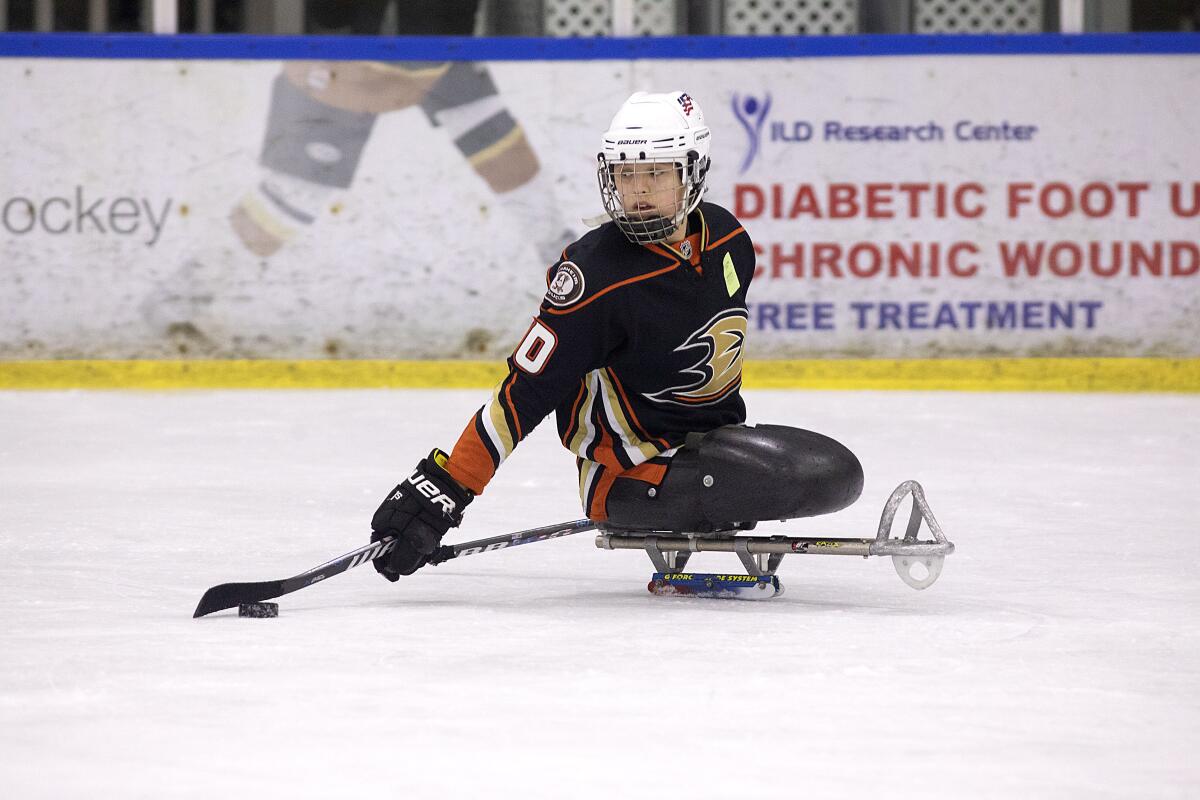
From the moment she tried sled hockey it became an ideal outlet for her energy and athletic talent. It has become much more than a game for her. “I was like, this is so empowering. It’s freedom. It’s happiness. It’s all of that in one bit,” she said. “From there I just knew it was my sport.”
Born in Marks, in Russia, she was diagnosed at birth with arthrogryposis multiplex, which affected joints in both legs. She would not be able to walk without crutches and braces, her mother was told. It would be a lot for a poor family in a small town to deal with. The doctor convinced her mother to put her up for adoption and the next day was placed in an orphanage, where she basically sat in a crib all day without hugs or stimulation.
It was pure chance that she was found by David and Fami Doederlein, who had three children but had room in their hearts for a special needs child. A friend had given them a VHS tape of children at the orphanage and had mentioned one she thought they’d like. “We were scrolling through the tape, and before we even saw the child that she wanted us to see, we saw Lera. And right away we knew she was the one,” said her father, David, who works in data analytics and merchandising for Petco near the family’s home in Rancho Bernardo.
John Gibson made 26 saves and allowed no goals but exited with an apparent injury, and the Ducks beat Toronto 2-1 for their fourth win in six games.
“She had bright eyes, she was very inquisitive and she was very aware of her surroundings. She was looking around and we noticed that when the nurse gave her a toy she looked at it, but when the nurse took the toy away, Lera immediate followed her as she walked away. Almost as if she wanted to say, ‘Where did my toy go?’”
The adoption process went quickly, and she was 21 months old when they took her home. She picked up English quickly and joined in school activities. “When Lera was growing up, she always wanted to play sports, but she was very limited because she was on braces and crutches,” David said. “She would do things like fun runs at the elementary school. She would go around on her braces and crutches with everybody else. Everybody would zoom past her, but she always finished. When we’d visit my parents, they had a little basketball court in their complex, and she’d always be out there throwing the ball.”
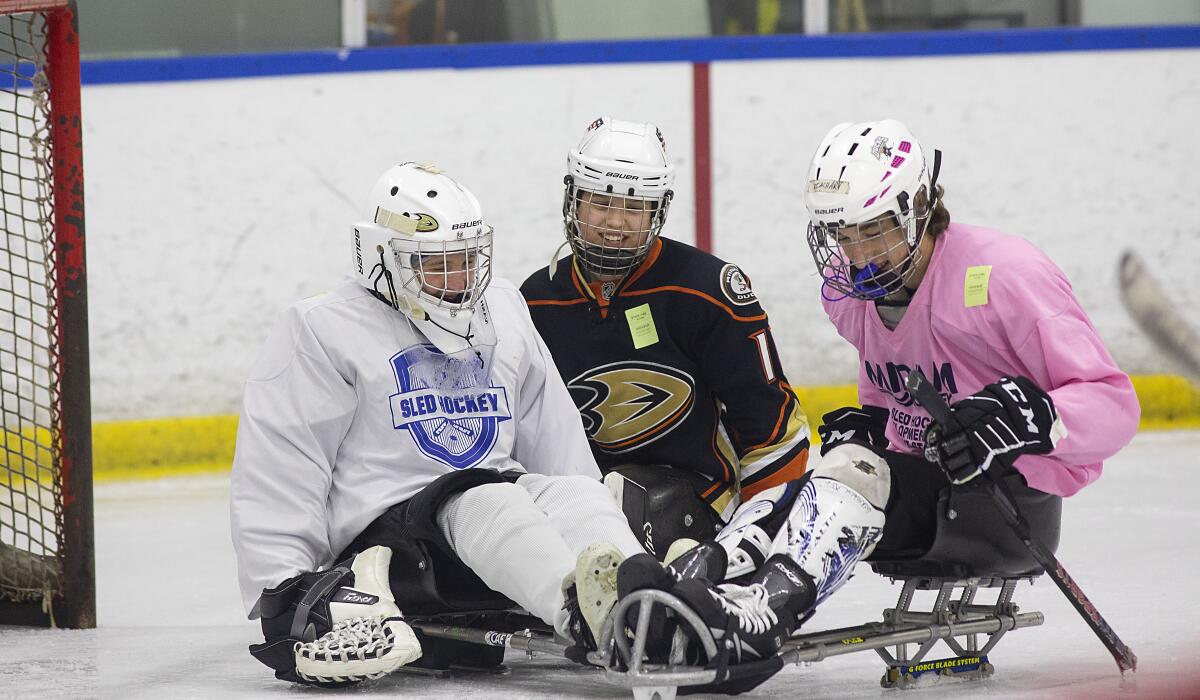
But as she grew, her struggles increased. Her legs couldn’t support her anymore, and she’d need a wheelchair. When one of her doctors suggested amputating both legs above the knee, David was opposed. Fami, a nurse, was more open to the idea. So was Lera, then 14. “I quickly came to deciding to do that, but it was really hard to commit up until the day of the surgery,” she said. “I really had to put my trust in God and the people who were working with me. And I had to trust myself that I would commit to this situation.”
David said the decision was made collectively by family members and her doctors, “but if Lera had said, no, I don’t want to do this, we wouldn’t.” It was elective surgery, not completely covered by insurance, so the Doederleins’ second son Isaac, a jiu jitsu standout, helped raise money by starting a Gofundme account. “He was always practicing his skills on me and pinning me to the ground and whatnot,” Lera said, laughing. “My older brothers always stuck up for me.”
The procedure was successful because she threw herself into rehabilitation with her typical dedication. It was a turning point for her. “Before then I wasn’t really sure where my life would go. I was unhappy with the way I was walking, and my thought process was just so negative,” she said. “And now I’m looking at life in such a great way that I know where I want to be in my life. I have a great family and friends, and I just continue to thrive, and without that surgery I don’t think that ever would have happened.”
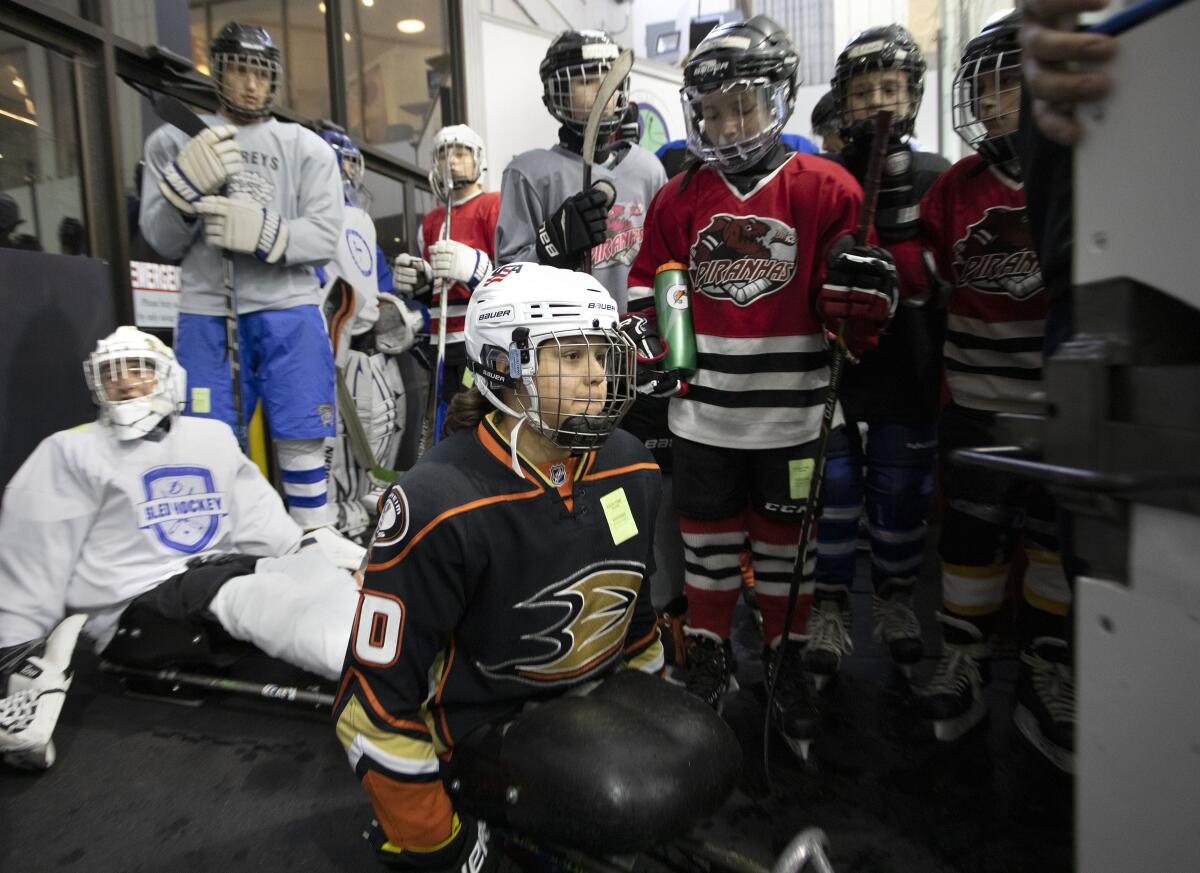
While meeting with the prosthetist who fitted her new legs, Lera met Mike Schulenberg, a single, above-knee amputee who played for the Arizona Coyotes’ sled hockey team. Double amputees thrive in sled hockey, he said. She wasn’t a hockey fan because she didn’t think she could play the sport. She had never considered sled hockey an option for her. “He looked at me for one second and said, ‘You’ve got to try sled hockey.’ So he invited me out to a practice, and as soon as I hit the ice, something just clicked,” she said.
Her initial experience was in a too-big borrowed sled. “But even then it was clear that the way she moved, that she had some potential,” David said. A $2,000 grant from the Challenged Athletes Foundation, which was presented to her during an appearance on the NHL Network, allowed her to get equipment that maximizes her skills. She scoots quickly around the ice now, and her sled, with its skate blade beneath the seat, has a short turning radius. She has the upper-body strength to propel herself forward using shortened sticks that have angled picks at one end, and she scored 10 of her team’s 19 goals last April at a disabled hockey festival, according to her proud father.
On a recent night she and teammate Zachary Grover took turns shooting at goaltender Parker Olenick on a section of the rink reserved for them, a creative session before the Pacific sled hockey tournament against teams representing the Kings, Vegas Golden Knights and Coyotes. Standup skaters occasionally encroached on their ice, but Lera and her teammates dodged them with ease. Once, her sled tipped, over but she righted herself and got back into the action. David watched calmly at rinkside.
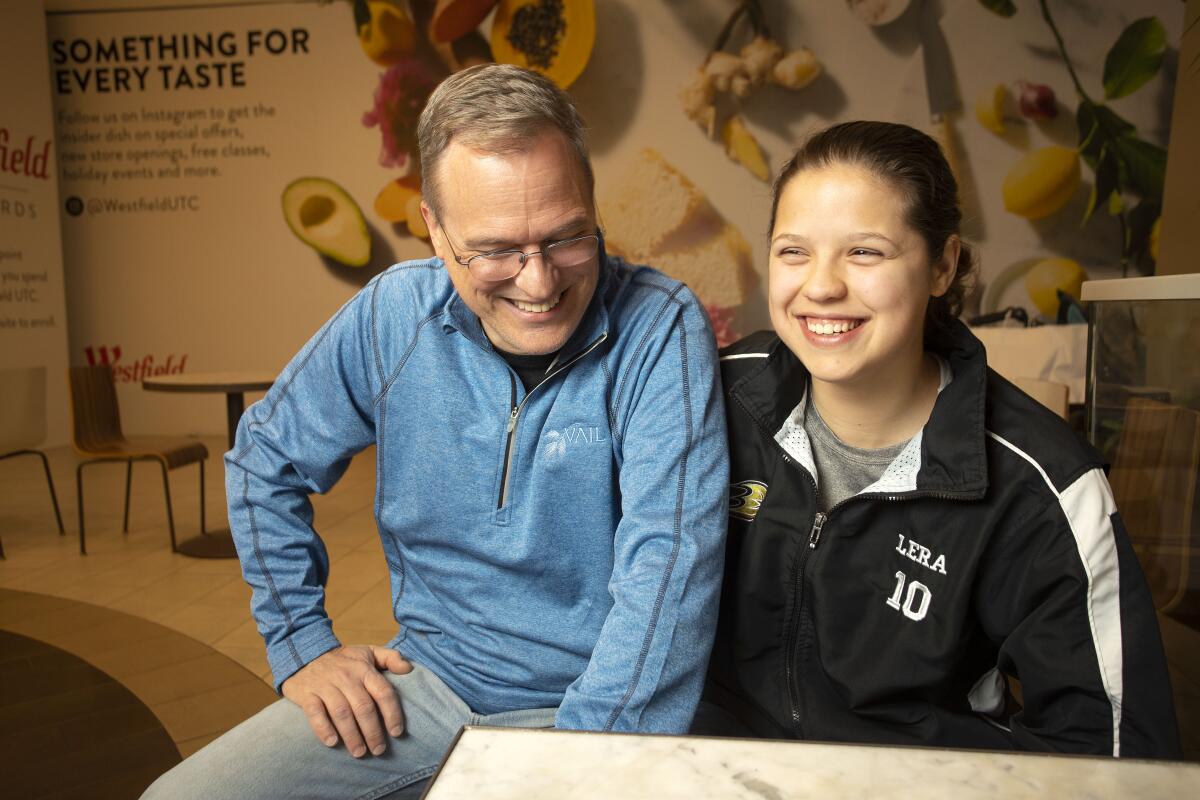
“I’m more worried about her when she does hand-cycling because that can be dangerous, more dangerous than hockey,” David said. “You get out on the road, you can run yourself off the road, a car can hit you.”
The hour went by fast. She was on to the next activity, the next dream, the next barrier she intends to overcome.
“My motto is no bad days. Just keep your head up and keep going,” she said. “I’m definitely one of the lucky ones. Being born at the time that I was and being seen by my adoptive parents, it has just been an opportunity that I will never take for granted. Most kids in my situation never got the opportunity to play the sports they wanted, or to have great friends and family. I’m in the best place possible right now.”
More to Read
Go beyond the scoreboard
Get the latest on L.A.'s teams in the daily Sports Report newsletter.
You may occasionally receive promotional content from the Los Angeles Times.

